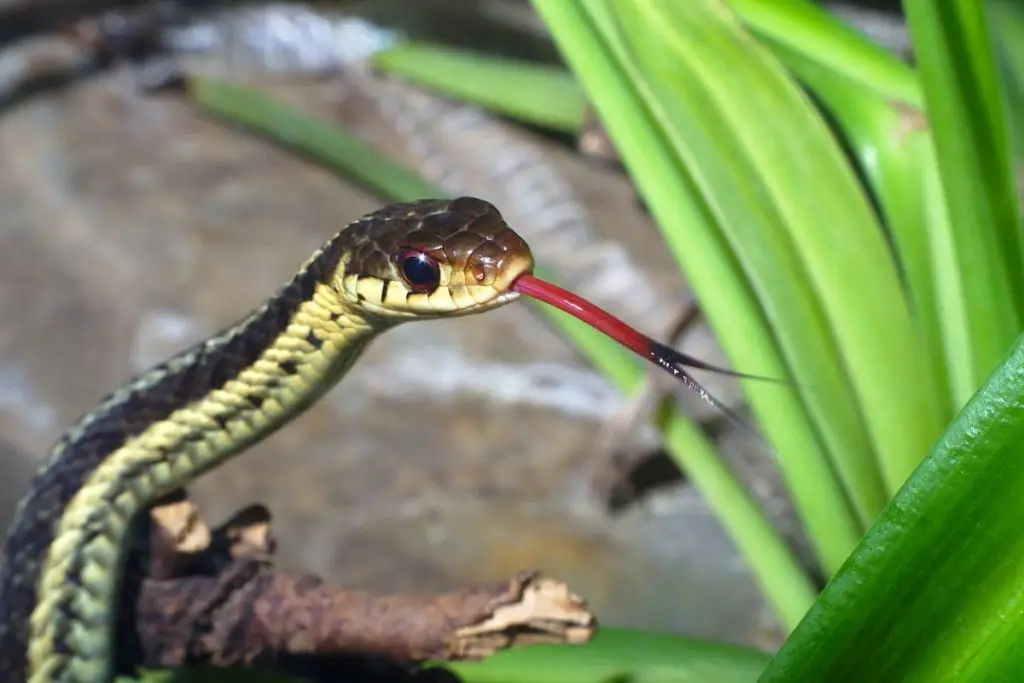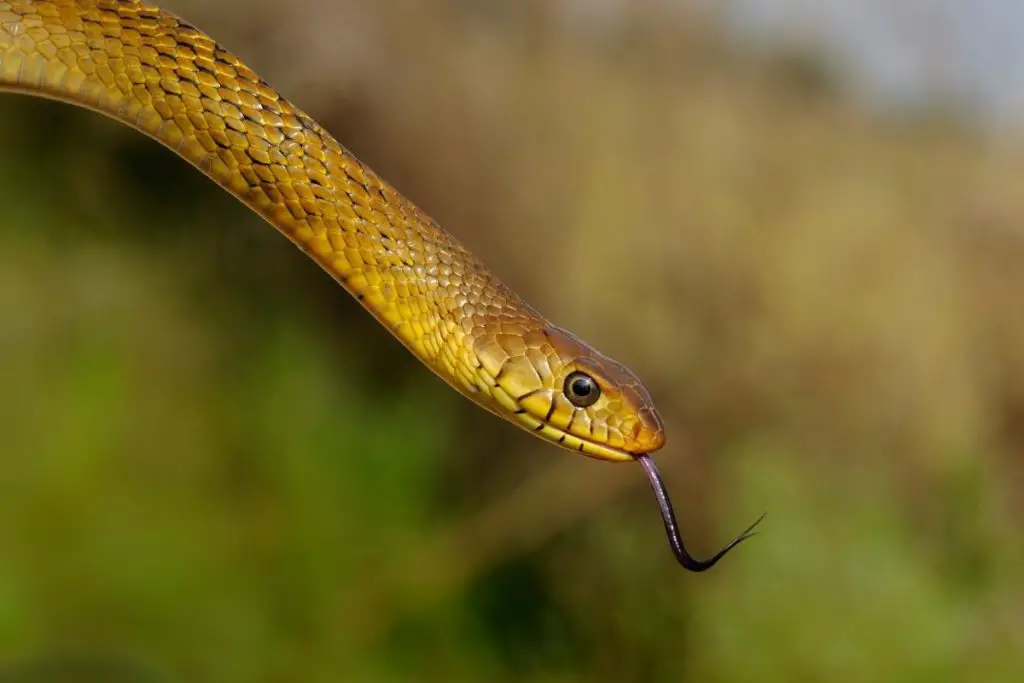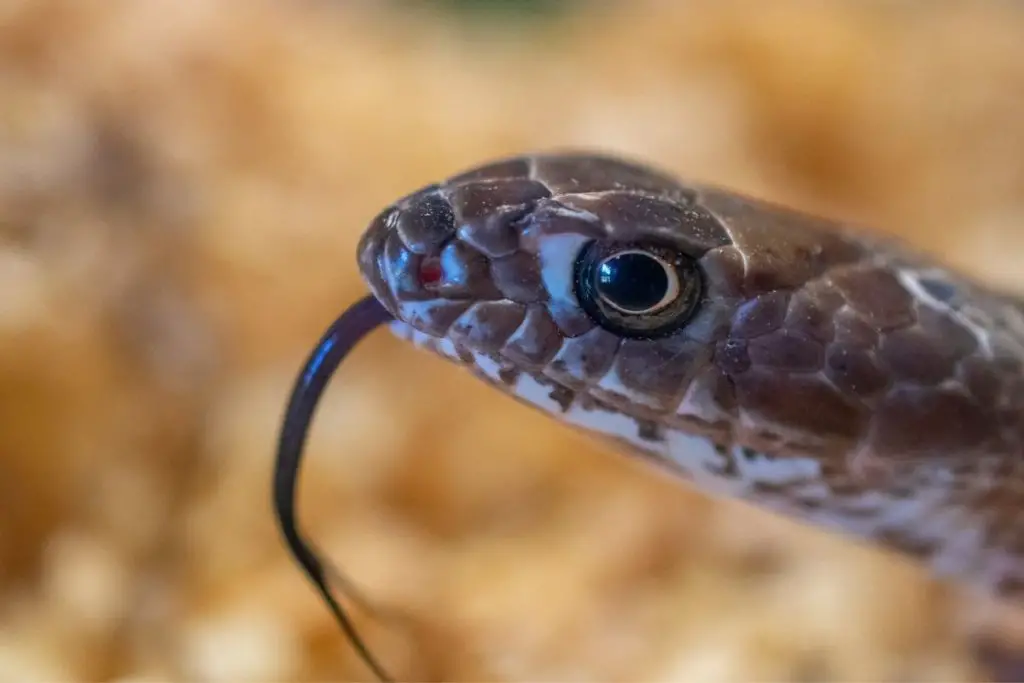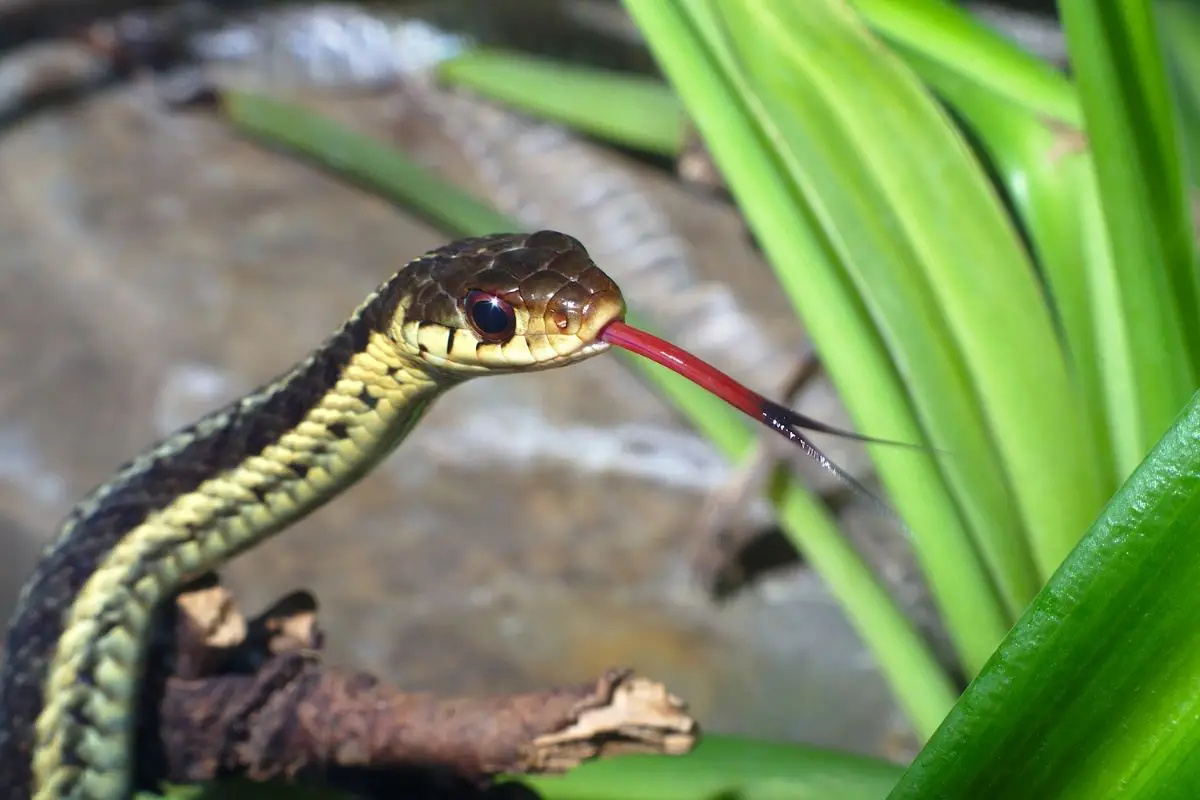You always see pictures of snakes flicking their tongue, but have you ever seen the snake use the tongue for anything else?
Many snake owners spend a lot of time watching their snakes and then they finally ask the question; do they even use the tongue for?
I was asked this question many times before, so I did some research and asked some experts, and here is what I’ve found out.
So, do snakes lick? Snakes do not lick. Snakes have a super sensitive tongue that allows the snake to make sense of the surroundings by combining scent and taste cues, and snakes flick their tongue to draw the scent particles into their mouths and in contact with their scent-processing center.
The tongue of your snake is quite amazing, actually, and we need to spend some time discussing it so you can understand what your snake can sense and what it can’t.
In this article, I’m going to answer all your questions about your snake’s tongue, so stick around.
Contents
How Your Snake’s Tongue works

A snake’s tongue works differently than a human tongue does. To begin with, a snake does not require its tongue to consume food.
A snake does not licks with its tongue, as does a dog. Instead, their tongue is solely used to gather scent markers from the external environment and transport them into the mouth for processing by Jacobson’s organ.
A snake’s forked tongue is used to gather information and sweeps through the air like a broom, collecting as many odor signals as it can.
You’ll notice a snake’s tongue sweeping up and down, as well as flicking, if you’ve observed it up close like I have, and like almost all the snake owners that I know.
The snake’s tongue moves back and forth in a side-to-side motion, similar to that of a fish. This action sweeps scent particles from one side of the mouth to the other, allowing it to follow a trail even more effectively. This actually helps it while hunting.
Remember, all snakes need to eat meat, and they need to capture their food or starve.
So, to help them track down the prey they have bitten and escaped, or search for prey they have only recently smelled, their busy tongues are crucial.
Because a snake has extremely limited eyesight, it employs scent particles to build a 3D representation of its surroundings.
Their sense of smell is keener than ours, allowing them to see things more clearly.
A snake, on the other hand, does not have a typical nose; rather, it has what you can call a watchman nose that serves only to awaken the tongue and invites it to explore.
When a snake smells something, its nose tells the tongue to flick, which leads to hunting.
The reason for a snake’s forked tongue, according to Adkins and Laidlaw, is that it allows more scent particles to be collected by providing a greater surface area.
The nostrils help a snake make sense of its world by informing it of scents from the left and right. This is why a snake can “see” in complete darkness.
Do Snakes lick things?

Now that you know how a snake’s tongue works, do they lick things?
No, snakes do not lick. They use their tongues to gather scent particles and information about their surroundings.
You may have seen your snake flick its tongue while it was in the wild or even when it was in your home. This is because it is trying to recreate how it hunts and eats in the wild.
It uses its tongue like a whip, which gathers scent particles from the air around your snake’s mouth and ensures that they do not get away.
Snakes do lick their prey before consuming them, but this licking has nothing to do with smelling; rather, it is used to immobilize their prey.
Why do Snakes flick their tongue?
The snake’s tongue does not move the scent markers it collects in its mouth.
Instead, by flicking, the snake gathers more markers and then scrapes them off with its closed lips, putting the scent particles on the Jacobson’s organ.
When the scent payload has been dropped, it flings back out to collect more scents.
Why do Snakes Stick out their tongue?

A snake sticks out its tongue when it smells something.
The forked tongue collects scent particles from the air and transfers them to the Jacobson’s organ, which is located in the roof of a snake’s mouth.
This allows snakes to “see” their environment through their sense of smell.
Why do snakes lick you?
Snakes do not lick you, but in fact, they are smelling you. When you see a snake sticking out its tongue when you’re nearby, it’s not because they want to lick you, but instead that they want to smell you better.
Do snakes poison you with their tongue?
Snakes do not poison with their tongues.
The myth that a snake can poison someone with its tongue comes from the fact that some snakes do have venom in their mouths.
However, they cannot inject this venom into you with their tongues. Instead, they use their tongues to taste and smell you.
When a snake flicks its forked tongue out and touches your skin, it leaves a layer of scent particles behind.
These smell particles help the snake understand what you are and how to react, as well as where to go next.
Snakes do not lick their prey before eating them; instead they use their tongues to track down injured animals so they can be eaten more easily after being bitten first by the snake.
Snakes swallow their mouth whole, they do not lick or chew them.
Conclusion:
So do snakes lick? They do not use their tongues for tasting, but rather gathering scent particles and information about the environment around them. Snakes do flick their tongues as they smell all the new scents that come into contact with it. This helps your snake build a mental map of its surroundings so it knows exactly where it is in its environment.
Snakes do not lick things, but their tongues do help them to understand and create a mental map of the world around them.
Helpful Resources
Why do snakes flick their tongue?
Why do Snakes use their tongue
If you like this article, please share it!

